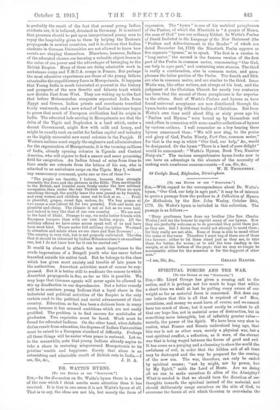DR. WATTS'S HYMNS.
[To rue EDITOR OF TEE "SPECTATOR.") SIU,—In the discussion on Dr. Watts's hymn there is a view of the case which I think merits more attention than it has received. 'kis that in one sense it is not Watts's hymn at all. That is to say, the ideas are not his, but merely the form of expression. The " hymn" is one of his metrical paraphrases of the Psalms, of which the Ninetieth is "A prayer of Moses, the man of God" (see our ordinary Bibles). In Watts's Psalms of David Imitated in the Language of the New Testament (the "Preface and Advertisement to the Reader" of which are dated December 1st, 1718) the Ninetieth Psalm appears as five separate "hymns," so to speak. The first is a 'version in "long metre," the second is the famous version of the first part of the Psalm in common metre, commencing "Our God, our help in ages past," and containing nine stanzas. The third is really a continuation, also in common metre, and para- phrases the latter portion of the Psalm. The fourth and fifth are also in common metre, and are similar to the third. Issue Watts was, like other writers, not always at his best, and the judgment of the Christian Church for nearly two centuries has been that the second of these paraphrases is far superior to the others. Such of Watts's Psalms and hymns as hare found universal acceptance are now distributed through the hymn-books used by different bodies of Christians. But from Watts's own time until about fifty or sixty years ago his "Psalms and Hymns" were bound up by themselves and used,often in connexion with some smaller collections of hymns by various authors. I well remember as a boy hearing these hymns announced thus "We will now sing, to the praise and glory of God, Psalm Ninety, Part One, common metre," for that is the way in which "Our God, our help," &a., would be designated. Or the hymn "There is a land of pure delight" would be announced: "Watts's Hymns, Book Two, Number Sixty-six." The various comprehensive hymn-books now in use have an advantage in the absence of the necessity of making such cumbrous anztouncements.—I am, Sir, itc.,














































 Previous page
Previous page